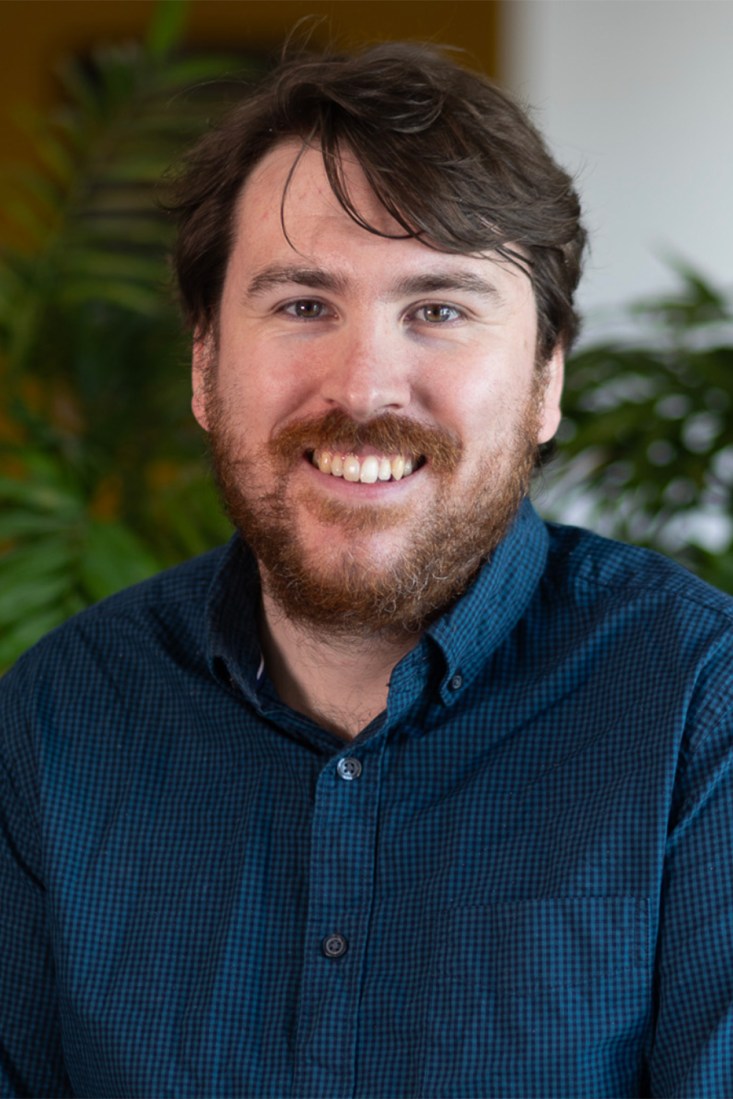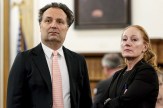Meet the Northeastern ‘math adviser’ behind Apple TV’s new series ‘Prime Target’
Lecturer Tim Davis was described by Leo Woodall, the actor playing math mastermind Edward Brooks in the program, as a “genius” for his work advising the scriptwriters and cast.

LONDON — Tim Davis has had a busy two years proofing scripts, coaching actors and signing off on episode cuts for a new show launch on Apple TV+.
But Davis isn’t in the television or film industry. His day job? He’s a lecturer in mathematics at Northeastern University in London.
“Prime Target”, Apple TV+’s latest thriller airing on Jan. 22, places mathematics front and center of its storyline. And when the producers realized they needed a math whiz to make sure all the numbers in the script added up, Davis stepped onto the scene.
After successfully landing the position of math adviser — as he is described on his IMDB page — at the start of 2023, Davis was tasked with coming up with the sums that would be carried out on screen by Edward Brooks, the show’s math genius and main character.
The eight-part miniseries follows Brooks, played by Leo Woodall from Netflix’s “One Day”, a postgraduate math student developing a prime-number-based “key” capable of accessing every computer in the world.

Davis, along with creator and scriptwriter Steve Thompson, was the brains behind the mathematical breakthroughs that propel the show’s narrative and end up putting Brooks directly into harm’s way.
“The script would basically say, ‘Character does math’ or ‘He does reels and reels of algebra and then crosses it out,’” Davis recalls. “And so I had to check, ‘OK — yes, we can do that.’
“And there were times as well when they would talk about math in the script and I would have to say, ‘Yes, that makes sense’ or, ‘No, it makes absolutely no sense at all to do this’ — and they would listen to me, thankfully.”
Once the script-proofing was done, Davis then moved on to the film set, with scenes shot on location in Cambridge, England, and also at Farnborough International Studios — situated a short distance from London — to advise the actors in any scenes involving numbers.
“I’d meet up with the actors before they had to do some math and then I’d work through it with them,” Davis explains.
“I’d be with them on set while they were working, so I got to know them quite well. It could be very stressful because as soon as the director said ‘Action,’ I was relying purely on their memory. It is different with lines because everybody can somewhat remember lines — but these actors had to look like mathematicians. All the ones that did it were very good.
“In this TV show, the major thing is math, so we were filming math-based scenes for basically two weeks. And I think Leo [Woodall] kind of hated it after that — he was saying, ‘I’ve had enough, don’t ever talk to me about math again!’”
Woodall has since described Davis as a “genius” for his assistance during filming. The 28-year-old British actor, explaining how he prepared for his role in “Prime Target,” told Screen Rant: “For a lot of it, I had the preparation period of getting familiar with the math itself and spending time with our genius math consultant. That was one part of it.”
Davis is too self-deprecating to accept that label. But he acknowledges that the role set him a hefty challenge. In fact, it was effectively an impossible task.
“So the problem — and I said this to the producers — is it can’t be done,” he says of the program’s main premise that a human mind could produce a key to crack digital encryption codes.
Editor’s Picks
“There are theorems in math that show that what we’re trying to do can’t be done. You can’t factorize a number quickly enough without a quantum computer, so the show is completely fictitious.”
That reality presented Davis with a conundrum when coming up with the calculations that are integral to the program’s conclusion.
“At some stage you have to lie about what the math is doing — and math isn’t very good at lying,” he continues. “I went for the approach that all the math we were putting in there would be true and it would do the things we said it wants to do — but it just might not do it quick enough. I thought that was a better approach than trying to fudge it.”
Unlike numbers-rooted biopics like “Oppenheimer” or “The Imitation Game,” “Prime Target” features math that did not yet exist. The former films explore the lives of J. Robert Oppenheimer, the physicist behind the first nuclear weapon, and Alan Turing, the mathematician who decrypted German intelligence during World War II. In contrast, Davis had to largely create the math for “Prime Target” himself.
“I didn’t construct any new mathematics for the show,” he says. “But what I was doing was looking at loads of different results all over number theory and combining it in such a way that it would get to construct this new idea of being able to decode and factorize numbers quickly.”
That level of detailed involvement with a major visual production brought to bear its own satisfaction, with his work being brought to life. There are a host of scenes in “Prime Target” where viewers see the number-crunching that Davis prepared behind the scenes, from formulas written on lecture hall chalkboards that linger in the background, to cutaways of notebook scribbles.
“Anytime the main character does math or you see it in a shot — like it is shown on some paper on a desk or something — I had to write all the math for that or get it so that it was appropriate math,” Davis says.
“It was a little bit surreal because I had spent all this time preparing it and then I would see it in real life — it is an out-of-this-world experience.
“You see it and then you’re like, ‘Oh wow, this is really what I’ve done.’ It was fun. It was cool to see it all come together at the end.”











